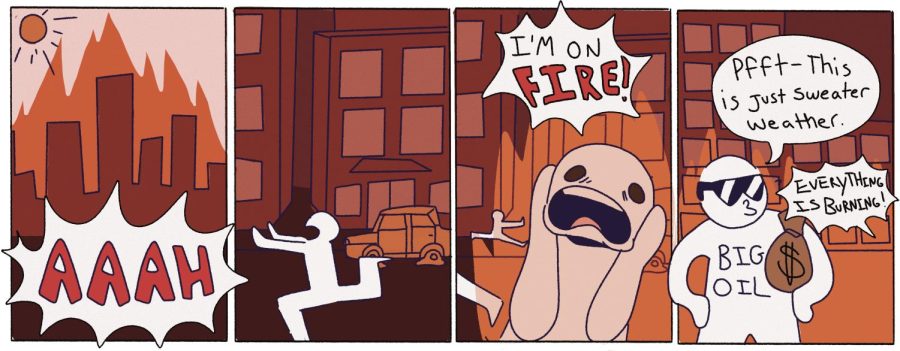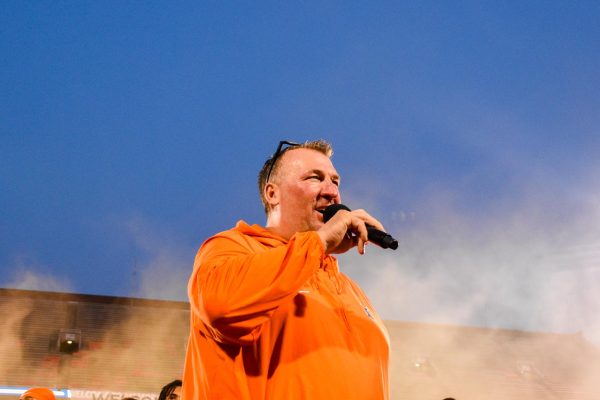Editorial | We are screwed.
April 19, 2022
The world is ending — at least, climate change experts seem to think it is. Scientists around the world are doing whatever they can to spread this message, going as far as chaining themselves to the fence of the White House or a JPMorgan Chase & Co. bank in Los Angeles.
Last week, over 1,000 scientists protested worldwide following the release of the Intergovernmental Panel on Climate Change 2022 report, which emphasized that greenhouse gas emissions must be significantly cut in the next three years to avoid catastrophic, irreversible damage to the Earth.
Yet, amid these amplifying pleas from climate experts, climate skeptics are everywhere. According to the 2021 Yale Climate Opinion Maps, a whopping 34% of participants said they were not concerned about global warming.
This lack of concern does not bode well for humanity. It slows initiatives that should be taken to reverse the effects of climate change before it’s too late. And time is ticking.
Sustainability efforts are often targeted at individual consumers. One is reminded of the “Save the Turtles” movement that went viral in 2019, spawned by a video of a sea turtle choking on a plastic straw — when in reality, mega-corporations are responsible for dumping metric tons of plastic into our oceans.
Get The Daily Illini in your inbox!
In an effort to deflect responsibility, these corporations perpetuate the assumption that the individual consumer has any power over reducing greenhouse gas emissions through misleading environmental campaigns. For example, the concept of a “carbon footprint,” which was popularized by BP and has been circulating for decades, emphasized the impact of a consumer’s lifestyle choices, such as electricity, gas and water consumption, on the environment.
BP was the culprit behind the Deepwater Horizon oil spill in 2010, which is considered to be the largest marine oil spill in history. This spill occurred four years after BP’s carbon footprint ad campaign told individuals to go on a “low-carbon diet.”
Consumers are left to wonder how many minutes need to be cut from their shower time to offset the 130 million gallons of crude oil in the Gulf of Mexico that still affects marine wildlife today.
Social media hasn’t helped eco-friendly efforts, either.
Sustainability movements that live on social media platforms like TikTok and Instagram have significantly contributed to the narrative that an individual can live sustainably to help the environment. Though these movements may have good intentions, they are often preached by privileged populations, are driven by guilt and tend to alienate many populations.
After the “Save the Turtles” movement, the world collectively ganged up on plastic straws. Starbucks changed its lids to reduce plastic straw consumption in 2020, and many companies followed, some even partially banning plastic straws from their establishments.
Those with disabilities that have difficulty consuming beverages find themselves left out of this conversation or guilt-tripped for using plastic straws. Some may find reusable straws difficult to wash, and paper and other biodegradable straws fall apart quickly; plastic straws often end up being the most reliable option.
What’s worse is that banning plastic straws has failed to make a significant difference in the grand scheme of things. According to National Geographic, plastic straws only make up 0.025% of the 8 million tons of plastic waste dumped into the ocean annually.
Advertisers need to stop pushing sustainability as an individual issue. Climate change impacts everyone, making it a collective social issue.
Environmental change begins at the government. To make a real difference, start local. Scope out environmental groups and legislation and hassle politicians.
Climate education should be first and foremost. Listen to scientists — they’ve dedicated their whole lives to saving humanity.
If you’re still going to be stubborn and not listen to facts, then go outside and breathe in the fresh, slightly warmer air. You won’t be able to in a couple years.







